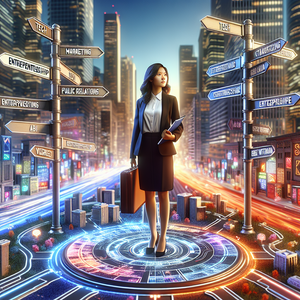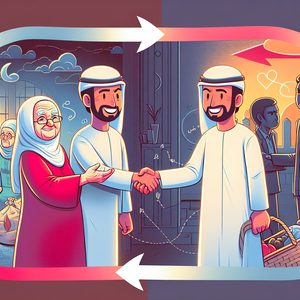Future-Proofing Your Skills Against Geopolitical Shifts: The Skills That Survive Borders

In a world marked by constant disruption, adaptability is no longer optional—it is essential. Defined as the ability to adjust to new conditions, adaptability enables individuals to respond effectively to change, whether prompted by technological advancements, economic shifts, or geopolitical challenges. It is the skill that allows people to pivot in uncertain times, turning obstacles into opportunities. The COVID-19 pandemic is a prime example of how adaptability can determine success. As workplaces shuttered overnight, millions of professionals had to transition to remote work. Those who embraced new tools like Zoom, Slack, and cloud-based collaboration platforms were able to maintain productivity, while those resistant to change found themselves struggling to keep up. Beyond the pandemic, geopolitical events like Brexit have also underscored the importance of adaptability. Businesses and individuals alike were forced to navigate new trade regulations, supply chain disruptions, and market shifts, with those open to change emerging more resilient. Adaptability is not just about reacting to change but proactively preparing for it. This might mean continuously learning new skills, exploring alternative career paths, or embracing emerging technologies like artificial intelligence and blockchain. In a world where industries can rise and fall overnight, adaptability ensures that individuals remain relevant, regardless of their location or profession.
Critical Thinking as a Universal Compass
In an age of information overload, critical thinking is the lighthouse that guides individuals through turbulent waters. With the internet and social media inundating us with information 24/7, the ability to evaluate, analyze, and synthesize data is indispensable. Critical thinking equips people to separate fact from fiction, make informed decisions, and solve complex problems—capabilities that are invaluable across cultural and geographic boundaries. Take the pervasive challenge of misinformation as an example. Social media platforms are rife with fake news, clickbait, and content designed to manipulate emotions rather than inform decisions. Without critical thinking skills, individuals risk falling victim to propaganda, scams, and poor decision-making. Whether you are a voter analyzing political rhetoric, an investor assessing financial opportunities, or an employee evaluating a job offer, critical thinking empowers you to make choices rooted in logic and evidence. Moreover, critical thinking is a skill that transcends industries. Employers in every corner of the world—from tech companies in Silicon Valley to healthcare organizations in Singapore—value individuals who can approach challenges with creativity and logic. For instance, an engineer solving a complex technical problem in Germany, a teacher devising innovative lesson plans in Brazil, or a marketer crafting strategies in India all rely on the same foundational ability to think critically. It is a borderless skill that provides clarity and direction in a chaotic world.
Cross-Cultural Communication: Bridging Divides in a Globalized World
In today’s interconnected economy, cross-cultural communication has emerged as a vital skill for professionals and organizations alike. Despite a rise in nationalism and regionalism, the reality is that businesses, governments, and individuals must often collaborate across borders. This makes the ability to understand, respect, and effectively communicate with people from diverse cultural backgrounds a non-negotiable skill in the modern world. Cross-cultural communication goes beyond speaking different languages; it involves understanding cultural norms, values, and perspectives. For example, collaboration between colleagues from Japan, Sweden, and Nigeria might involve navigating differences in communication styles, decision-making processes, and work ethics. A professional who can bridge these cultural gaps fosters harmony and cooperation, ensuring the success of multinational teams. The global success of companies like Airbnb and Uber highlights the value of cross-cultural communication. These businesses expanded into diverse markets by tailoring their services to local customs while maintaining a unified global brand. This required employees skilled in understanding cultural nuances and creating solutions that resonated with local consumers. Similarly, international NGOs rely heavily on cross-cultural communication to address global challenges such as climate change, poverty, and healthcare disparities. In an increasingly fragmented world, the ability to communicate across cultures is not just a professional asset but a societal necessity. It fosters understanding, reduces conflict, and enables individuals and organizations to work together toward common goals.
Why These Skills Are Uniquely Human
What makes adaptability, critical thinking, and cross-cultural communication so powerful is their deeply human nature. While artificial intelligence and automation are revolutionizing industries, these skills are rooted in qualities that machines cannot replicate: empathy, creativity, and emotional intelligence. Machines may excel at data processing and repetitive tasks, but they lack the ability to adapt to complex, unpredictable situations, think critically about abstract concepts, or navigate the intricacies of human relationships. Moreover, these skills are highly transferable. Unlike technical skills tied to specific roles or industries, the ability to adapt, think critically, and communicate effectively across cultures is valuable in any context. Whether you are a software developer, a healthcare worker, an artist, or an entrepreneur, these abilities provide a foundation for success. They are the ultimate form of job security, equipping individuals to pivot, evolve, and seize opportunities wherever they arise.
As the world continues to grapple with geopolitical shifts, economic disruptions, and technological transformations, the need for timeless, borderless skills has never been more urgent. Adaptability, critical thinking, and cross-cultural communication are more than just buzzwords; they are essential tools for navigating an unpredictable future. These skills transcend industries, regions, and professions, offering individuals the resilience and versatility to thrive no matter where they find themselves. In a world where borders blur and traditional frameworks collapse, cultivating these abilities is not just a strategy for professional success—it is a means of staying grounded and empowered amidst uncertainty. By mastering the skills that survive borders, you can future-proof yourself against the challenges of tomorrow and embrace the opportunities of a rapidly changing world. Whether you’re navigating a geopolitical shift, adapting to a new industry, or collaborating across cultures, these skills will anchor you in a sea of change and guide you toward a brighter, more resilient future.
Global Strategy Consultant
McKinsey & Company, Boston Consulting Group, Deloitte, and global think tanks
Responsibilities
Analyze geopolitical trends, market shifts, and economic disruptions to provide actionable insights for businesses.
Develop strategies for companies to adapt to international trade regulations, supply chain challenges, and cross-border expansion.
Collaborate with multidisciplinary teams to design solutions that navigate global uncertainties while driving growth.
Required Skills
Expertise in geopolitical analysis, market research, and risk assessment.
Strong adaptability and cross-cultural communication skills to engage with global stakeholders.
Unique Qualifications
Knowledge of international trade law, policy analysis, and fluency in multiple languages are often advantageous.
Intercultural Training Specialist
International corporations like Google, Airbnb, and NGOs such as the United Nations or Red Cross
Responsibilities
Design and deliver programs to equip professionals with cross-cultural communication skills for global collaboration.
Provide tailored training on cultural norms, business etiquette, and negotiation strategies for diverse markets.
Act as a bridge between multicultural teams to resolve misunderstandings and improve organizational harmony.
Required Skills
Deep understanding of cultural dynamics, including non-verbal communication and cross-border team-building.
Experience in adult learning methodologies and public speaking.
Unique Qualifications
Background in anthropology, linguistics, or international relations is often beneficial.
Data Ethics and Misinformation Analyst
Social media companies like Meta (Facebook), Twitter, and NGOs focused on media integrity
Responsibilities
Investigate and counter the spread of misinformation on digital platforms using critical thinking and data analysis.
Develop ethical guidelines for data usage and algorithmic transparency in tech organizations.
Collaborate with policymakers, media outlets, and tech firms to implement solutions for combating fake news.
Required Skills
Proficiency in data analytics tools like Python, R, or Tableau, paired with strong analytical reasoning.
Understanding of media literacy, information systems, and societal impacts of technology.
Unique Qualifications
A background in journalism, digital ethics, or public policy adds value.
Change Management Specialist
Multinational corporations like IBM, Amazon, and consulting firms specializing in transformation
Responsibilities
Lead organizational transitions during periods of technological disruption, mergers, or regulatory changes.
Train teams to adopt new processes, tools, or cultural shifts, ensuring smooth adaptation to change.
Assess risks and design communication strategies to engage employees and stakeholders effectively.
Required Skills
Strong problem-solving abilities, emotional intelligence, and adaptability.
Experience with frameworks like ADKAR or Prosci for managing change.
Unique Qualifications
Certification in change management or organizational psychology is often required.
Sustainability and Climate Policy Advisor
Institutions like the World Bank, United Nations, or multinational companies with sustainability initiatives
Responsibilities
Advise governments, corporations, or NGOs on strategies to address climate change while navigating geopolitical complexities.
Analyze the impact of environmental policies on global supply chains and recommend sustainable practices.
Facilitate international collaborations to tackle pressing global challenges such as renewable energy transitions.
Required Skills
Expertise in environmental science, policy analysis, and international relations.
Strong communication skills to bridge gaps between policymakers, businesses, and the public.
Unique Qualifications
Advanced degrees in environmental science, economics, or public policy are often required.


